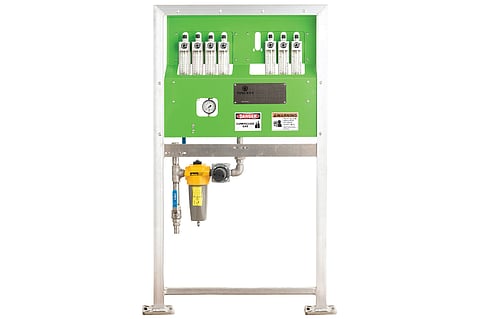

Scottish Sea Farms will soon begin conducting trials of a new aeration system designed to protect salmon from potentially harmful plankton.
Whilst many species and concentrations of plankton are vital to a healthy ecosystem, others can be harmful to humans and animals. In the case of farmed salmon, plankton can cause damage to the gills, depriving fish of oxygen.
Aeration – the process of pumping air into salmon pens to boost water movement and, in turn, water quality – is one of several protective measures taken by salmon farmers when rising levels of plankton are detected during daily water monitoring.
Standard aeration systems use generic industrial compressors to pump in this air but with mixed results; if air flows are not evenly distributed, for example, then those pens closest to the compressor tend to receive the biggest boost of air.
The new system custom-designed by Canadian technology company Poseidon Ocean Systems combines a specially engineered compressor, main distribution line, and tripod diffusers placed deep within every pen, with each pen having its own eight-channel control panel. The system moves water with lower phytoplankton and higher ambient oxygen upwards, improving the environment within all pens.
The system effectively draws clean water from depth of the pen – in other words, well away the planktonic surface layers – and distributes it upwards, improving water quality throughout the whole pen, said Innes Weir, Scottish Sea Farms Regional Production Manager for Mainland.
The system also comes with the additional option of "bubble curtains" that create a barrier to plankton and other biological challenges such as jellyfish infestations, significantly reducing the concentration of these potentially harmful organisms within open pen systems.
The tests, which will start this month, will see six of the trial farm's 12 pens connected to the new aeration system and the remaining six pens served by a standard compressor. Weir said the company will be looking to see what day-to-day difference the system makes to the feed rate, growth, and survival of the salmon overall.
Scottish Sea Farms said it also wants to gauge what protection the system can deliver during a plankton event or periods of low oxygen.
The system can be set to run 24/7 for routine water quality improvement then moved to protection mode as required, with energy efficiency integral to its design.
